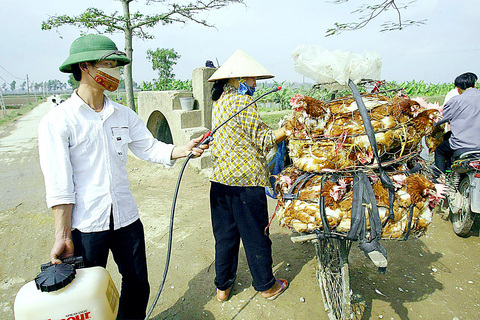Vietnam yesterday reported another human death from bird flu, bringing the toll to 10 people over the past month as officials scramble to control the latest outbreak of the virus that scientists fear could give rise to the next pandemic.
Doctors also said two additional people were sickened with the virus, bringing the number of people stricken with the avian flu to 15 in the current wave of infections.

PHOTO: AFP
The latest victim was a 32-year-old man from northern Phu Tho province who died Thursday after spending five days in Bach Mai Hospital in Hanoi, a doctor there said on condition of anonymity.
The man had developed a high fever, coughing and breathing difficulties on Jan. 12, said Nguyen Dinh Trong, director of Phu Tho provincial Preventive Medicine Center.
Doctors were still trying to determine how he caught the disease, which is usually traced to direct contact with sick birds.
The World Health Organization has warned that if the virus alters and becomes easily spread from person-to-person, it could spark a global pandemic.
However, there is no evidence that the virus has undergone such a mutation yet.
The man's family raised poultry, but none of them have shown signs of illness, Trong said, adding that there were no bird flu outbreaks reported among poultry in his village.
Trong, however, said the man was involved in the trade of poultry from infected areas six months ago, but has stopped since then.
Meanwhile, two other men, ages 66 and 30, from Hanoi and Hung Yen province respectively, tested positive for the H5N1 strain of bird flu and remained in stable condition yesterday, said the doctor at Bach Mai Hospital.
On Thursday, officials said two girls, ages 10 and 13, tested positive for the virus in southern Vietnam and remained in critical condition yesterday.
The older girl's mother died from the disease last week after the two of them slaughtered a duck.
Since Dec. 30, at least 10 people have died of bird flu in Vietnam. The virus emerged last year, spreading rapidly through poultry farms of Asia, killing or forcing the cull of millions of birds in 10 countries, and jumping to humans in Vietnam and Thailand.
Over the past year, bird flu has killed 30 people in Vietnam and 12 in Thailand.
Vietnam is struggling to contain its latest outbreak of bird flu ahead of next month's Lunar New Year celebrations, when thousands of people are on the move. Chicken is traditionally served during new year feasts.
WHO was not expected to issue any travel advisories for people visiting Vietnam, despite the more than 200,000 overseas Vietnamese expected to return home to visit relatives during the holiday.
But Hans Troedsson, WHO representative in Vietnam, said visitors should avoid all contact with sick birds and only eat poultry products that have been thoroughly cooked.
Last year Vietnam banned the sale and transport of poultry during the holiday.
No bans have been put in place this year, but animal health officials have advised people to wear masks and gloves when slaughtering poultry and to avoid handling birds if they have any type of open wounds on their skin.

Indonesia yesterday began enforcing its newly ratified penal code, replacing a Dutch-era criminal law that had governed the country for more than 80 years and marking a major shift in its legal landscape. Since proclaiming independence in 1945, the Southeast Asian country had continued to operate under a colonial framework widely criticized as outdated and misaligned with Indonesia’s social values. Efforts to revise the code stalled for decades as lawmakers debated how to balance human rights, religious norms and local traditions in the world’s most populous Muslim-majority nation. The 345-page Indonesian Penal Code, known as the KUHP, was passed in 2022. It

‘DISRESPECTFUL’: Katie Miller, the wife of Trump’s most influential adviser, drew ire by posting an image of Greenland in the colors of the US flag, captioning it ‘SOON’ US President Donald Trump on Sunday doubled down on his claim that Greenland should become part of the US, despite calls by the Danish prime minister to stop “threatening” the territory. Washington’s military intervention in Venezuela has reignited fears for Greenland, which Trump has repeatedly said he wants to annex, given its strategic location in the arctic. While aboard Air Force One en route to Washington, Trump reiterated the goal. “We need Greenland from the standpoint of national security, and Denmark is not going to be able to do it,” he said in response to a reporter’s question. “We’ll worry about Greenland in

PERILOUS JOURNEY: Over just a matter of days last month, about 1,600 Afghans who were at risk of perishing due to the cold weather were rescued in the mountains Habibullah set off from his home in western Afghanistan determined to find work in Iran, only for the 15-year-old to freeze to death while walking across the mountainous frontier. “He was forced to go, to bring food for the family,” his mother, Mah Jan, said at her mud home in Ghunjan village. “We have no food to eat, we have no clothes to wear. The house in which I live has no electricity, no water. I have no proper window, nothing to burn for heating,” she added, clutching a photograph of her son. Habibullah was one of at least 18 migrants who died

Russia early yesterday bombarded Ukraine, killing two people in the Kyiv region, authorities said on the eve of a diplomatic summit in France. A nationwide siren was issued just after midnight, while Ukraine’s military said air defenses were operating in several places. In the capital, a private medical facility caught fire as a result of the Russian strikes, killing one person and wounding three others, the State Emergency Service of Kyiv said. It released images of rescuers removing people on stretchers from a gutted building. Another pre-dawn attack on the neighboring city of Fastiv killed one man in his 70s, Kyiv Governor Mykola